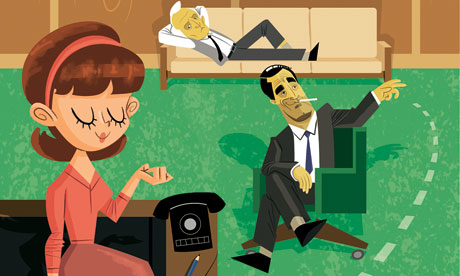
A few months back, a friend – a freelance journalist I'll call Ethan – pitched some ideas to an editor at a magazine. When he got no response, he sent a polite email, which elicited an apology. Oh, God, I'm sorry, said the editor (I'm paraphrasing; not all editors are this polite), but things are just so busy here! Weeks passed; Ethan sent another reminder, and got another apology: I'll get to them soon! If this humdrum exchange had happened in 1992, Ethan would probably have let it pass, picturing the editor late at his desk, gobbling pizza, surrounded by stacks of letters and articles, calling his sad-faced children to say goodnight from the office for the fourth night running. But it was 2012, and there was a problem: the whole time he'd been pleading overwork, the editor had been visibly active, day after day, on Twitter. He didn't have time to respond to Ethan's ideas. But that video about the guy who turned his dead cat into a helicopter? That was another matter.
I made sympathetic noises, but the truth is my heart was with the editor. Several times recently, I explained, colleagues waiting for work from me had expressed the opinion that, since apparently I had time to tweet, I had no excuses for delay. It's long been observed, of course, that life in the internet era is more public, but we tend to think of that in terms of governments or businesses tracking our online activities, or prospective employers discovering our drunken college antics on Facebook. Less remarked is what's happened to the art of slacking off. More and more, when we slip away surreptitiously for a few minutes' idleness, we do so in ways that are partially or entirely public, and so not surreptitious at all.
The problem, I tell my sceptical hasslers, isn't that I'm a slacker; it's that we're all slackers, yet only some kinds of slacking seem like slacking – not only to others, but even to ourselves. In office life, especially, the downtime we all require gets woven imperceptibly into the day, in conversations at the coffee machine or 10 minutes' zoning-out during a meeting. (Researchers don't agree on how much time the average office worker wastes a day, but conservative estimates put it at around a couple of hours.) Working from home, I say in injured tones, means Twitter might be the closest I get to another human all morning. I might be abnormally pitiful, but I'm not abnormally lazy.
Never mind my moaning, though. The Orwellian implications of internet publicness are generally cause for alarm, but in the case of slacking, more exposure could work wonders, freeing us from the illusion that there's anyone who isn't doing it. As the workplace psychology expert Tony Schwartz says, the notion of a workday of eight solid hours is a creation of the industrial revolution, an effort to treat humans, who need to cycle between rest and effort through the day, like machines, which don't. We're always reading reports about the hours we waste on Twitter and Facebook. But no one, so far as I know, has tried to compare that to the hours we used to spend staring out of windows or making necklaces from paper clips. We've always frittered time away. The difference now is that we're going to have to admit it.
• The Antidote: Happiness For People Who Can't Stand Positive Thinking, by Oliver Burkeman, is published by Canongate at £15. To order a copy for £12, including mainland UK p&p, go to guardianbookshop.co.uk
oliver.burkeman@theguardian.com
Follow Oliver on Twitter.

